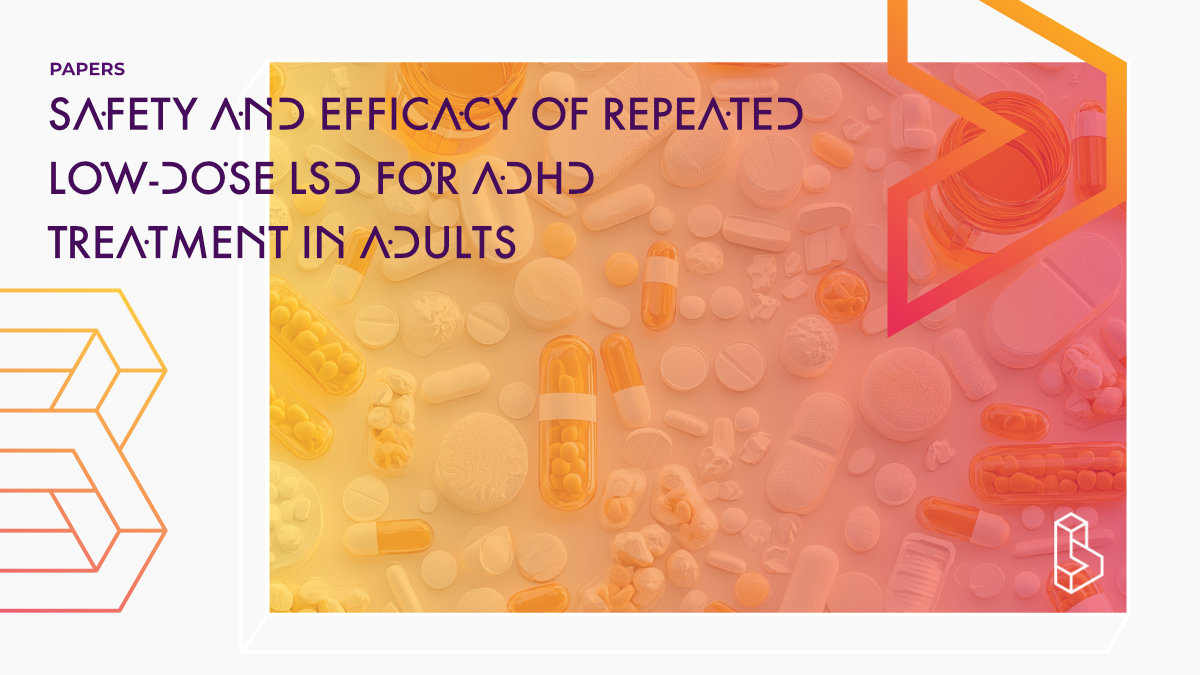This double-blind placebo-controlled trial (n=53) testing LSD microdosing (20μg; 2xp/w; 6w) for adults with moderate to severe ADHD found that while the treatment was safe and well-tolerated, it showed no advantage over placebo in reducing ADHD symptoms, with both groups showing similar improvements on standardised symptom measures.
Abstract of Safety and Efficacy of Repeated Low-Dose LSD for ADHD Treatment in Adults
“Importance Microdosing psychedelics, including lysergic acid diethylamide (LSD), has gained attention for its potential benefits in several psychiatric disorders, including attention-deficit/hyperactivity disorder (ADHD). However, LSD’s efficacy in reducing ADHD symptoms remains unknown.
Objective To determine the safety and efficacy of repeated low doses of LSD in reducing ADHD symptoms compared with placebo.
Design, Setting, and Participants This was a 6-week, multicenter, double-blind, placebo-controlled, parallel-group phase 2A randomized clinical trial conducted between December 17, 2021, and December 4, 2023. Data were analyzed from March 22, 2024, to August 19, 2024. Outpatient treatment was provided at 2 centers: University Hospital in Basel, Switzerland, and Maastricht University in the Netherlands. Adults aged 18 to 65 years with a prior ADHD diagnosis who presented with moderate to severe symptoms (Adult Investigator Symptom Rating Scale [AISRS] score ≥26 and Clinical Global Impression Severity score ≥4) were eligible for inclusion. Key exclusion criteria included selected current major psychiatric or somatic disorders and the use of potentially interacting medications.
Intervention Participants received either LSD (20 μg) or placebo twice weekly for 6 weeks (total of 12 doses).
Main Outcome and Measures The primary outcome was the change in ADHD symptoms from baseline to week 6, assessed by the AISRS and analyzed with a mixed-effects model for repeated measures.
Results A total of 53 participants were randomized to LSD (n = 27) or placebo (n = 26). Mean (SD) participant age was 37 (12) years, and 22 participants (42%) were female. The LSD group presented a mean AISRS improvement of −7.1 points (95% CI, −10.1 to −4.0). The placebo group presented a mean AISRS improvement of −8.9 points (95% CI, −12.0 to −5.8), with no difference between groups. LSD was physically safe and psychologically well tolerated overall.
Conclusions and Relevance In this randomized clinical trial, repeated low-dose LSD administration was safe in an outpatient setting, but it was not more efficacious than placebo in reducing ADHD symptoms.“
Authors: Lorenz Mueller, Joyce Santos de Jesus, Yasmin Schmid, Felix Müller, Anna Becker, Aaron Klaiber, Isabelle Straumann, Dino Luethi, Eline C. H. M. Haijen, Petra P. M. Hurks, Kim P. C. Kuypers & Matthias E. Liechti
Summary of Safety and Efficacy of Repeated Low-Dose LSD for ADHD Treatment in Adults
Attention-deficit/hyperactivity disorder (ADHD) is a common neurodevelopmental condition affecting approximately 2.6% of adults globally. The disorder is characterised by symptoms of inattention and/or hyperactivity-impulsivity, often causing substantial impairment in various aspects of life and frequently occurring alongside other psychiatric conditions. While conventional treatments like stimulants (methylphenidate and amphetamines) and non-stimulants (atomoxetine) are generally effective in the short term, about 20-40% of patients do not achieve adequate response. Furthermore, adverse effects can lead to treatment discontinuation, and long-term adherence remains problematic, with only about half of patients continuing methylphenidate treatment after six years.
In recent years, microdosing psychedelics has gained considerable attention as a potential alternative treatment approach. This practice involves taking small amounts of psychedelics such as LSD or psilocybin, typically one-tenth to one-twentieth of a recreational dose, with the aim of enhancing well-being, cognitive functions, and emotional processes without inducing significant perceptual changes or interfering with daily activities. Survey data and naturalistic studies have indicated that some individuals use microdosing to self-treat various conditions, including ADHD, with reports suggesting positive impacts on symptoms. Common microdosing protocols involve taking LSD doses ranging from 5 to 20 micrograms, typically once every three days over several weeks.
Methods
Study Design and Participants
Mueller and colleagues conducted a 6-week, double-blind, placebo-controlled Phase IIA randomised clinical trial at two centres: University Hospital in Basel, Switzerland, and Maastricht University in the Netherlands. The study recruited adults aged 18 to 65 years with a previously established ADHD diagnosis and moderate to severe current symptoms, as measured by standardised rating scales. Key exclusion criteria included past or present psychotic disorders in participants or their first-degree relatives, current substance use disorder, and other conditions likely to require hospitalisation or treatments that could interfere with the study.
Procedures
Find this paper
https://doi.org/10.1001/jamapsychiatry.2025.0044
Open Access | Google Scholar | Backup | 🕊
Cite this paper (APA)
Mueller, L., de Jesus, J. S., Schmid, Y., Müller, F., Becker, A., Klaiber, A., ... & Liechti, M. E. (2025). Safety and Efficacy of Repeated Low-Dose LSD for ADHD Treatment in Adults: A Randomized Clinical Trial. JAMA Psychiatry.
Study details
Topics studied
Microdosing
Study characteristics
Original
Placebo-Controlled
Double-Blind
Randomized
Participants
53
Humans
Institutes
Institutes associated with this publication
MindMedMindMed is one of the largest companies in the psychedelics space and is developing various psychedelics for mental health disorders.
Maastricht University
Maastricht University is host to the psychopharmacology department (Psychopharmacology in Maastricht) where various researchers are investigating the effects of psychedelics.
University of Zurich
Within the Department of Psychiatry, Psychotherapy and Psychosomatics at the University of Zurich, Dr Mialn Scheidegger is leading team conducting psychedelic research and therapy development.
Compound Details
The psychedelics given at which dose and how many times
LSD 20 μg | 12xLinked Clinical Trial
Safety and Efficacy of Low Dose MM-120 for ADHD Proof of Concept TrialThis study measures the safety and efficacy of repeated low dose MM-120 as treatment for ADHD in adults: a multi-center, randomized, double-blind, placebo-controlled trial.

